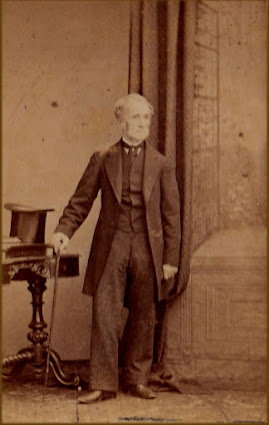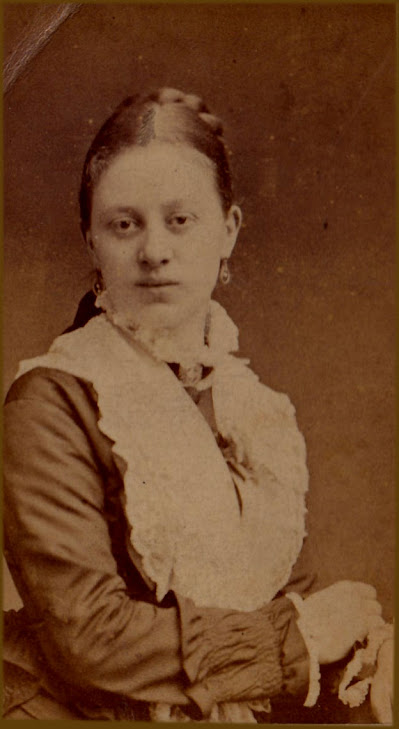FREDERICK HENRY MARVELL BLAYDES, 1818-1908
FREDERICK HENRY MARVELL BLAYDES, MA, hon, Oxford LLD, Trin Col Dublin, Phil D Budapest, Halle Athens & Corfu (1818–1908),
classical scholar, born at Hampton Court Green on 29 Sept. 1818, was the
third son of Hugh Blaydes (1777–1829) of High Paull, Yorkshire, and of Ranby
Hall, Nottinghamshire, J.P. and high sheriff for the latter county; his mother
was Delia Maria, second daughter of Colonel Richard Wood of Hollin Hall,
Yorkshire. James Blaydes of Hull, who married on 25 March 1615 Anne, sister of
the poet Andrew Marvell, was a direct ancestor.
FREDERICK HENRY MARVELL BLAYDES
as a young boy
After his father died in 1829, Blaydes was sent to a private school at Boulogne, and thence, on 14 Sept. 1831, to St. Peter's School, York, where he became a free scholar in June 1832 and gained an exhibition before matriculating at Oxford, 20 Oct. 1836, as a commoner of Christ Church. John Ruskin, about five months his junior, was already a gentleman commoner there, and Thomas Gaisford [q. v.] was dean (of. Ruskin, Præterita, 1900, i. 371). In 1838 Blaydes was elected Hertford scholar and a student of Christ Church Oxford, On June 28th, 1838 during the vacation he attended the Coronation of Queen Victoria at Westminster Abbey having a seat over the sanctuary and he remembers seeing the Young Queen Victoria step forward to assist Lord Rolls who stumbled in going up to make his obeisance. In the 9+ Easter term 1840 4 was placed in the second class in literae humaniores along with (Sir) George Webbe Dasent [q. v. Suppl. I] and James Anthony Froude [q. v. Suppl. I], He graduated B.A. in 1840, proceeding M.A. in 1843.
After a long tour (which he described in family letters) through France and Italy in 1840-1, finally spending a week in Athens, he returned to Oxford in Aug. 1841. and issued an edition of Aristophanes' 'Birds' (1842), with short Latin notes. He was an ordained deacon in 1842 and a priest in 1843, and he accepted the college living in Harringworth, Northamptonshire. Harringworth was Blaydes' home for forty-three years (1843-86). A staunch 'protestant,' he joined on 10 Dec. 1850 the deputation from his university which, headed by the Chancellor, the Duke of Wellington, presented an address to Queen Victoria against the 'papal aggression' (The Times, 11 Dec. 1850).
But Blaydes' interest and ample leisure were mainly absorbed by
classical study. In 1845 he published an edition of a second play of
Aristophanes the 'Acharnians.' In 1859 he published in the 'Bibliotheca
classica' three plays of Sophocles. The reception of the book was not
altogether favourable, and a difference with the publishers (Bell & Daldy)
led him to issue the four remaining plays with Williams & Norgate
separately. He reckoned that he gave more than twenty years to Sophocles, and,
with intervals, more than fifty to Aristophanes.
In 1871 the Prince of Wales (later Edward
VII) suffered an attack of typhoid fever
(Enteric Fever) (the illness of which his father had died 10 years
earlier) while at his home, Sandringham in Norfolk. F.H.M. Blaydes traveled
from Brighton to Sandringham in the depth of winter to advise the Prince of
Wales’s physicians of an American remedy. The medicine was approved and used by
the Prince of Wales’s physicians with excellent results. The medicine was the
concentrated Tincture of Baptisia Tinctoria and Fowler's solution of Arsenic,
the dose of one drop of each in a wineglass of water, to be repeated every half
hour after longer intervals.
Blaydes resigned his benefice in 1884, and from 1886 lived at Brighton.
In 1907 he moved to Southsea, where he died, retaining his vigour till near the
end, on 7 Sept. 1908; he was buried in Brighton cemetery.
The scholarship meant for Blaydes what it had
meant for Elmsley at Oxford, for Porson and Dobree at Cambridge. With the later
and more literary school of Sir Richard Jebb in England and von
Wilamowitz-Moellendorff in Germany he had small sympathy. He likewise considered
the study of Chaucer and Shakespeare a waste of time. Verbal criticism and the
discovery of corrupt passages mainly occupied him, and his fertile and
venturesome habit of emendation exposed his work to disparagement (N. Wecklein
in Berliner philologische Wochenschrift, 28/20, 1908). Yet a good
many of his emendations have been approved by later editors, most recently by
Sir Hugh Lloyd-Jones and N.G. Wilson in their Sophocles (Oxford
Classical Texts, 1990), in which many of Blaydes's proposals are either
accepted in the text or thought worthy of mention in the apparatus
criticus. Blaydes's own views on the editing of classical texts are to be
found in the introduction to his Sophocles (vol. 1) and in the
preface to The Philoctetes of Sophocles (1870).
The University of Dublin made him Hon. LL.D. on 6 July 1892; he was also
a Ph.D. of Budapest, and a fellow of the Royal Society of Letters at Athens.
Blaydes made a hobby of homeopathy and delighted in music, being an
accomplished singer and naming his third son, George Frederick Handel, after
the composer. To St. Paul's school, where his eldest son was a pupil, he was a
munificent benefactor. In 1901 he presented to it the greater part of his
classical library, amounting to 1300 volumes, with many framed engravings,
principally of Italian scenery, now hung in the dining hall. In the following
years, he gave many specimens of marble from the Mediterranean basin, together
with more pictures, books, and a large collection of curios. The ample fortune
which his first wife brought him he spent to the amount of 30,000l. on
his studies, collections, and the printing of his books.
married Rev F H M Blaydes
Blaydes married firstly, in 1843, Fanny Maria, eldest daughter and
eventually (on the death in 1874 of her only brother, Sir Edward Henry
Page-Turner, 6th baronet) one of the coheiresses of Sir Edward George Thomas
Page-Turner, of Ambrosden, Oxfordshire, and Battlesden, Bedfordshire; she was
killed in a carriage accident, 21 Aug. 1884, leaving issue three sons and four
daughters. Blaydes' second wife was Emma, daughter of Mr. H. R. Nichols.
Dorothy seated with baby Edward & F H M Baydes Constance, daughters of F H M Blaydes
Father of :
Edward Henry Samuel Blaydes, 24 July 1844 died at sea, died on his voyage home, between Taka and Foochow, age 21
Arthur Charles Julius Blaydes, born 6th August 1848
George Frederic Handel Blaydes, born 1849
Fanny Sophia Blaydes, born 1850/51
Blanche Sophia Blaydes, born 1851
Helen Blaydes born 1852
Constance Gertrude Blaydes born 1860
Blaydes' principal publications were:
1.
‘Aristophanis Aves,’ 1842.
2.
‘Aristophanis Acharnenses,’
1845.
3.
‘Sophocles,’ 1859 (vol. i. of
the ‘Bibliotheca classica’ edition).
4.
The ‘Philoctetes,’ ‘Trachiniæ,’
‘Electra,’ and ‘Ajax’ of Sophocles, 1870–5.
5.
‘Aristophanis quatuor fabulæ,’ a
collection subdated 1873–8.
6.
‘Aristophanis comici quæ
supersunt opera,’ 1886.
7.
‘Aristophanis comœdiæ’—his best
work; in 12 pts. dated 1882–1893.
8.
Nine sets of ‘Adversaria’ on
various authors, 1890–1903.
9.
‘Æschyli Agamemnon,’ 1898;
‘Choephoroi,’ 1899; ‘Eumenides,’ 1900.
10.
‘Spicilegium Aristophaneum,’
1902; ‘Spicilegium Tragicum,’ 1902; ‘Spicilegium Sophocleum,’ 1903.
11.
‘Sophoclis Œdipus Rex,’ 1904;
‘Œdipus Coloneus,’ 1904; ‘Antigone,’ 1905; ‘Electra,’ 1906; ‘Ajax,’ 1908;
‘Philoctetes,’ 1908.
12.
‘Analecta Comica Græca,’ 1905;
‘Analecta Tragica Græca,’ 1906.
13.
‘Miscellanea Critica,’ 1907.
[The Pauline, No. 170, pp. 172 ff. (with portrait); Oxford Magazine, 29
Oct. 1908; private information; Foster's Alumni Oxon.]

.jpg)













%20Helen%20Agnes%20Blaydes%20%201852%20children%20of%20F%20H%20M%20Blaydes%20and%20Fanny%20Maria%20nee%20Page-turner.jpg)
%20son%20of%20FHM%20Blaydes%20&%20Brother%20of%20FA%20Blaydes.jpg)






Comments
Post a Comment
Please leave any interesting factual comments relating to the post(s)